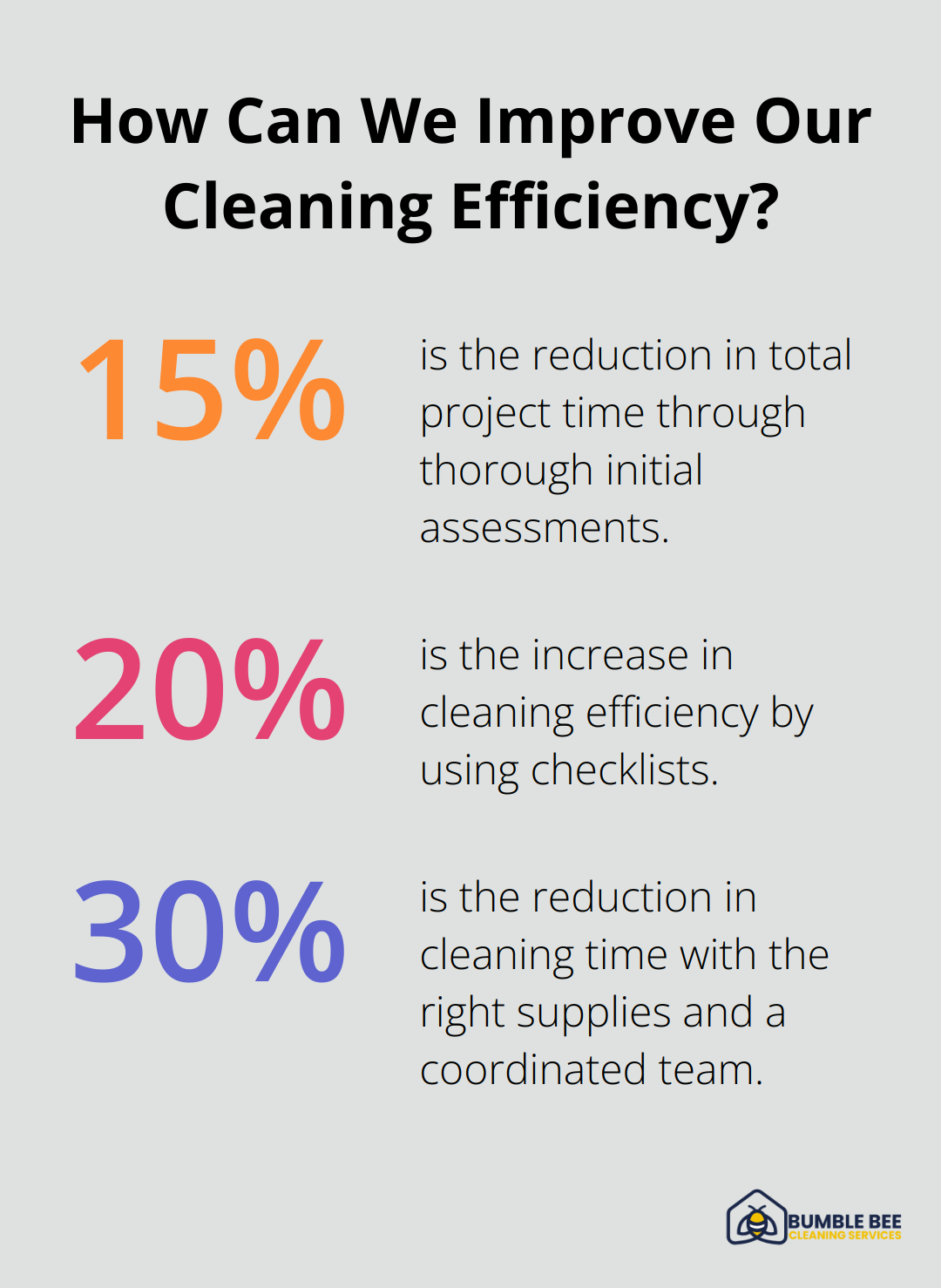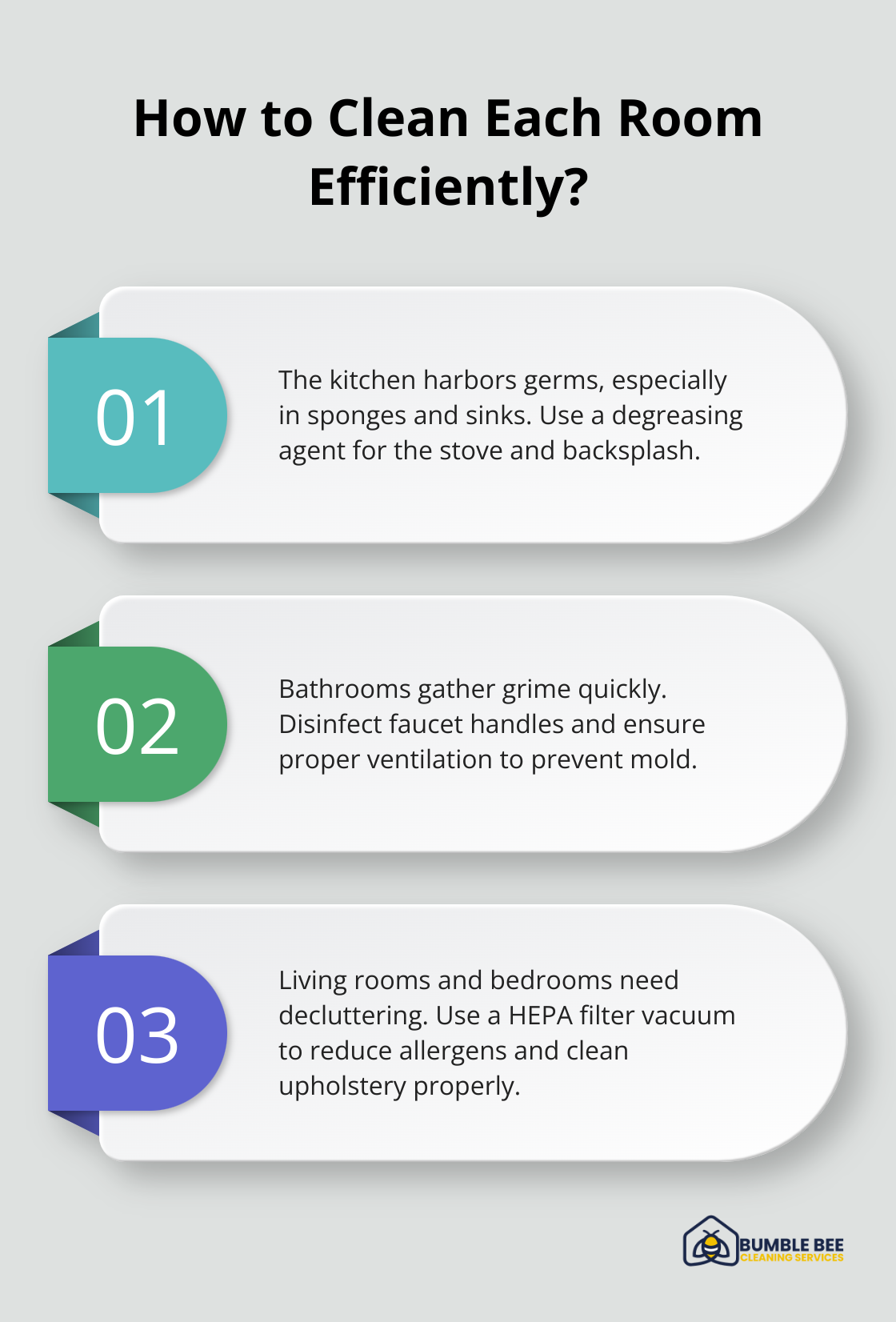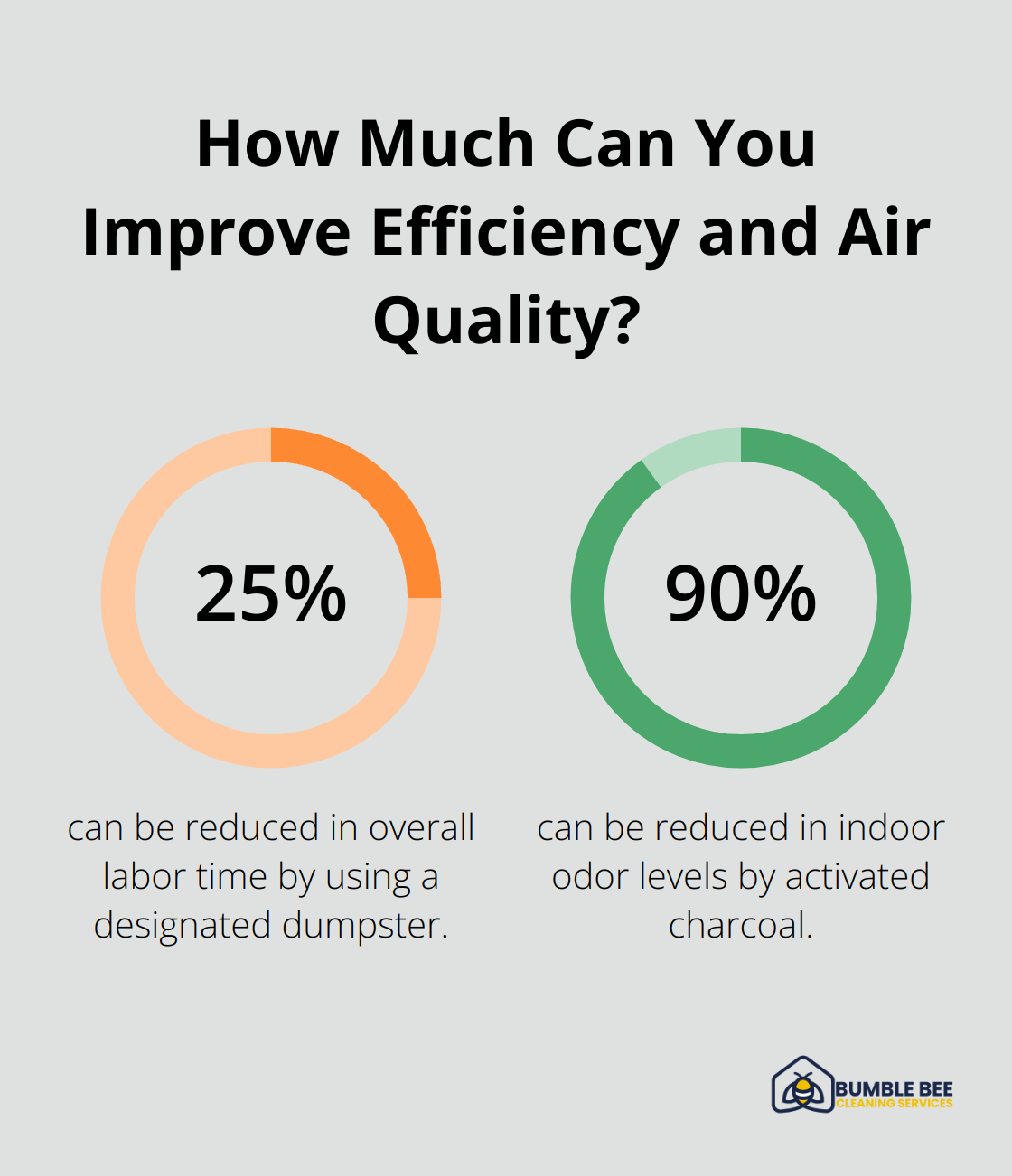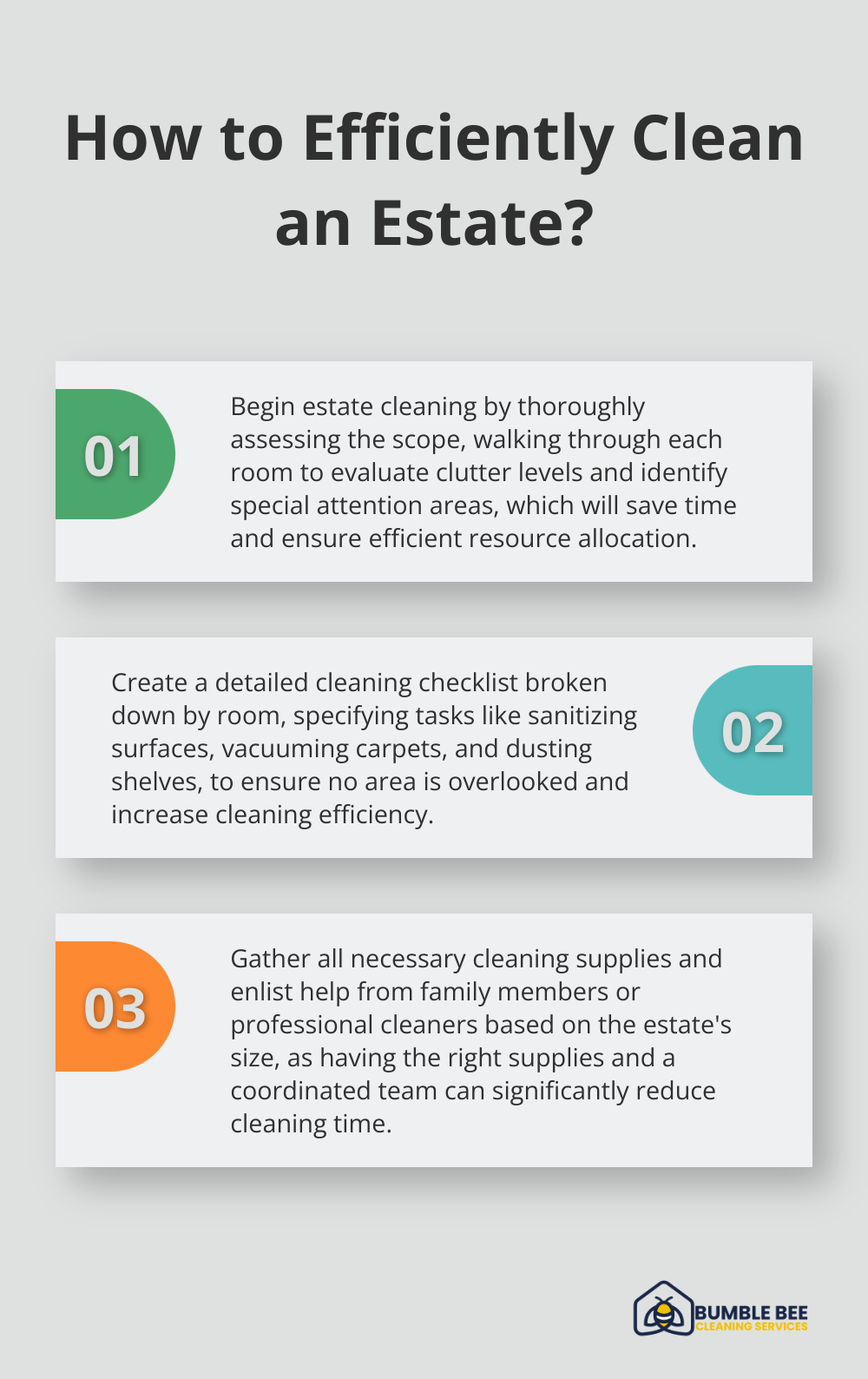Estate cleaning can be an overwhelming task without the right approach.
At Bumble Bee Cleaning Services, we believe proper planning and preparation are essential.
This guide covers best practices for effective estate cleaning, from essential planning steps to practical cleaning techniques.
How to Plan and Prepare
Effective estate cleaning begins with meticulous planning and preparation. Here’s how to get started.
Assess the Scope
Knowing the scale of the estate helps in planning. First, walk through each room and evaluate the level of clutter. Is there a significant amount of furniture to move? Are there any areas that require special attention? Identifying these factors early on saves time and ensures you allocate resources efficiently. According to a report by The Washington Post, thorough initial assessments can reduce total project time by up to 15%.
Create a Cleaning Checklist
A detailed cleaning checklist is indispensable. Break down tasks by room, and include specifics like sanitizing surfaces, vacuuming carpets, and dusting shelves. By following a structured checklist, you ensure nothing is overlooked. A study by the Journal of Environmental Health shows that using checklists can increase cleaning efficiency by 20%. Here’s a useful home deep cleaning checklist to help you get started.
Gather Supplies and Team Members
Before diving into the cleaning process, gather all necessary supplies. Stock up on cleaning agents, garbage bags, gloves, and tools for disassembling furniture. Additionally, enlist help from family members or professional cleaners, depending on the estate’s size. According to a survey by the American Cleaning Institute, having the right supplies and a coordinated team can reduce cleaning time by 30%.

Being well-prepared sets the stage for a smoother and more efficient cleaning process.
Room-by-Room Cleaning Techniques
Best Practices for Kitchen Cleaning
The kitchen is often the heart of a home and it’s usually one of the messiest areas to clean. Start by emptying all cabinets and drawers. This allows you to wipe down each surface thoroughly. For grease-laden areas like the stove and backsplash, use a degreasing agent. According to a study by NSF International, kitchen sponges and sinks are often the germiest spots in any home, so giving them special attention can significantly reduce bacteria levels.
Efficient Bathroom Cleaning Tips
Bathrooms can accumulate grime quickly, particularly in showers and bathtubs. Start from the top and work your way down. Scrub tiles and grout with a stiff brush and an effective cleaner. Research from the American Society of Microbiology shows that high-touch surfaces like faucet handles often harbor dangerous pathogens. Hence, disinfecting these areas is non-negotiable. Don’t forget air ventilation; mold thrives in damp environments, so using a bathroom fan or opening windows can help keep mold at bay. These tips can help streamline the process.
Living Spaces and Bedroom Cleaning Strategies
Living rooms and bedrooms require a different approach. Declutter first, making it easier to vacuum and dust. Focus on high-touch items like door handles, remote controls, and light switches. According to the Professional Cleaning Journal, dust mites can exacerbate allergies, so using a HEPA filter vacuum can help reduce allergens. Upholstery should also be cleaned with specific fabric cleaners to maintain its quality. For bedrooms, laundering all linens and vacuuming under the bed ensures a comprehensive cleanup.

Estate cleaning involves meticulous attention to each room’s unique challenges. Effective cleaning techniques ensure a thorough and manageable process.
Special Considerations for Estate Cleaning
Handling delicate and valuable items, managing waste, and ensuring proper sanitization are essential aspects of estate cleaning. Addressing these effectively can save time and effort while protecting valuable possessions.
Handling Delicate and Valuable Items
During estate cleaning, extra care is needed for delicate and valuable items. First, identify and itemize such possessions. Use padded packing materials for fragile items like glassware, artwork, and antiques. Label each package to avoid mishandling. For extremely valuable items, consider professional appraisal and specialized packing services. According to the US Bureau of Economic Analysis, the average value of household items in clinical appraisals can be significant, justifying the extra attention.
Managing Large Volumes of Waste and Recycling
Estate cleaning often results in large amounts of waste. Start with a strategy for sorting items into recyclable, donation, and disposal categories. Utilize local recycling services to handle materials like metal, paper, and glass. King County, for example, offers comprehensive waste recycling facilities to accommodate diverse needs. For bulkier waste, renting a dumpster might be cost-effective and save multiple trips to disposal sites. According to Waste Management, using a designated dumpster can reduce overall labor time by up to 25%.
Sanitizing and Deodorizing
Effective estate cleaning goes beyond surface cleaning; it’s about creating a hygienic and odor-free environment. Use EPA-approved disinfectants for high-touch areas. Pay special attention to areas prone to mold and mildew, like basements and bathrooms. Deodorizing spaces can be challenging but is essential for creating a fresh atmosphere. Activated charcoal, baking soda, and essential oil diffusers can neutralize odors effectively. Studies by the Journal of Environmental Science and Technology show that activated charcoal can reduce indoor odor levels by up to 90%.

Handling these special considerations guarantees a thorough and efficient estate cleaning process, safeguarding valuable items, managing waste responsibly, and maintaining a healthy living environment. For more insights on home cleaning tips, explore these tips.
Conclusion
Effective estate cleaning begins with detailed planning and preparation. Assessing the scope of the task, creating a thorough checklist, and gathering the necessary supplies are fundamental steps. These initial efforts set the stage for a more manageable cleaning process.

Detailed planning ensures that no area is overlooked. Using structured checklists boosts efficiency, while having the right supplies and team members significantly reduces cleaning time. Tools like HEPA filter vacuums help reduce allergens, enhancing the cleaning quality.
Addressing each room with specific techniques, from degreasing kitchens to disinfecting bathrooms, further ensures a thorough cleanup. Special care for delicate items and efficient waste management are also crucial. Sorting waste for recycling and using appropriate sanitizing agents help maintain hygiene and protect valuable items.
Estate cleaning is a significant undertaking, but with meticulous planning and execution, it can be highly effective. For those in the Greater Seattle and Atlanta areas, Bumble Bee Cleaning provides expert cleaning solutions, from house cleaning to post-construction clean-up. Using eco-friendly products, we offer flexible plans that cater to your specific needs, supporting the Seattle Children’s Autism Center with each service.
